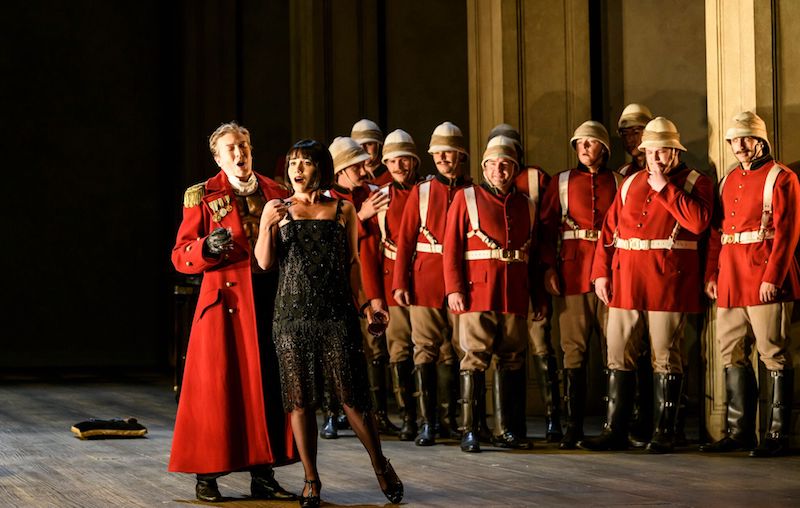Giulio Cesare, Glyndebourne Festival Opera
With its plum roles for the castrato Senesino and the soprano Francesca Cuzzoni, Handel’s Giulio Cesare enjoyed huge success when it opened in 1724; no other Handel opera has launched so many recital-programme favourites. Meanwhile David McVicar’s Glyndebourne staging of it has enjoyed similar acclaim: premiered in 2005, it’s now in its third revival.
The plot functions both as political commentary – the Romans are in the process of colonising Egypt – and as a love story running in parallel with a revenge saga. Cleopatra lays amorous siege to Cesare; angry young Sesto, encouraged by his mother Cornelia, is bent on avenging the murder of his father Pompey by the Egyptian king Tolomeo. McVicar brings the action forward to the British takeover of Egypt in 1882, but the ships which sail across his charming little backdrop suggest progressive updatings throughout the twentieth century.
Part of the cleverness of this production, with its witty designs by Robert Jones, lies in its seamless marriage of high tragedy with slapstick comedy, often in the course of the same aria: Cornelia bites Tomoleo’s ear as he tries to rape her, whereupon Tolomeo vents his fury by stamping on the toes of an attendant, who goes off limping – visceral shock followed by hilarity, while the music pursues its serene course. The invading marines are pure Gilbert and Sullivan; the Ottoman servants are straight out of the Illustrated London News.
 Sarah Connolly and Joélle Harvey ©Bill Cooper
Sarah Connolly and Joélle Harvey ©Bill Cooper
A similar duality operates in the way the characterisation takes its cues from the score. The aggression in Tolomeo’s music permits his representation as a pantomime baddie; we first encounter Cleopatra as a Bollywood starlet, pertly sexual and preposterously OTT, and this goes well with her high-spirited aria as she lays her traps for Cesare. But Handel the psychologist is also interested in development – Sesto maturing from angry teenager to fully-fledged man of war, Cleopatra the flirt morphing into a worthy imperial consort.
McVicar’s production is blessed with a cast capable of all this while also delivering a superb ensemble performance. It certainly helps that in counter-tenor Christophe Dumaux he has an acrobatic Tolomeo who can conjure up sight-gags while singing with impeccable smoothness, while in counter-tenor Kangmin Justin Kim he has a servant Nireno who can physically mime a coloratura trill. Sarah Connolly, who reprises the title role, started off worryingly underpowered on opening night, though her artistry won out as the opera progressed; her coloratura duel with an onstage violinist (Michael Gurevich) – anything you can do, I can do better – is a delight.
But the musical glory of this production lies partly in the pit – William Christie and the Orchestra of the Age of Enlightenment casting irresistible spells, and spreading a lustrous musical glow – and partly in three outstanding singers. Patricia Bardon’s Cornelia is a grandly tragic creation, while Anna Stéphany’s Sesto has a flame-like fury; the beauty of the solos and duets by these very contrasting mezzos makes time stand still. And in the American soprano Joélle Harvey we have a Cleopatra with consummate artistry: she’s an accomplished dancer and comedian, and a singer with the exquisite musicality which Handel’s score ideally demands, and for much of this evening she’s exercising all these talents at once.
★★★★★